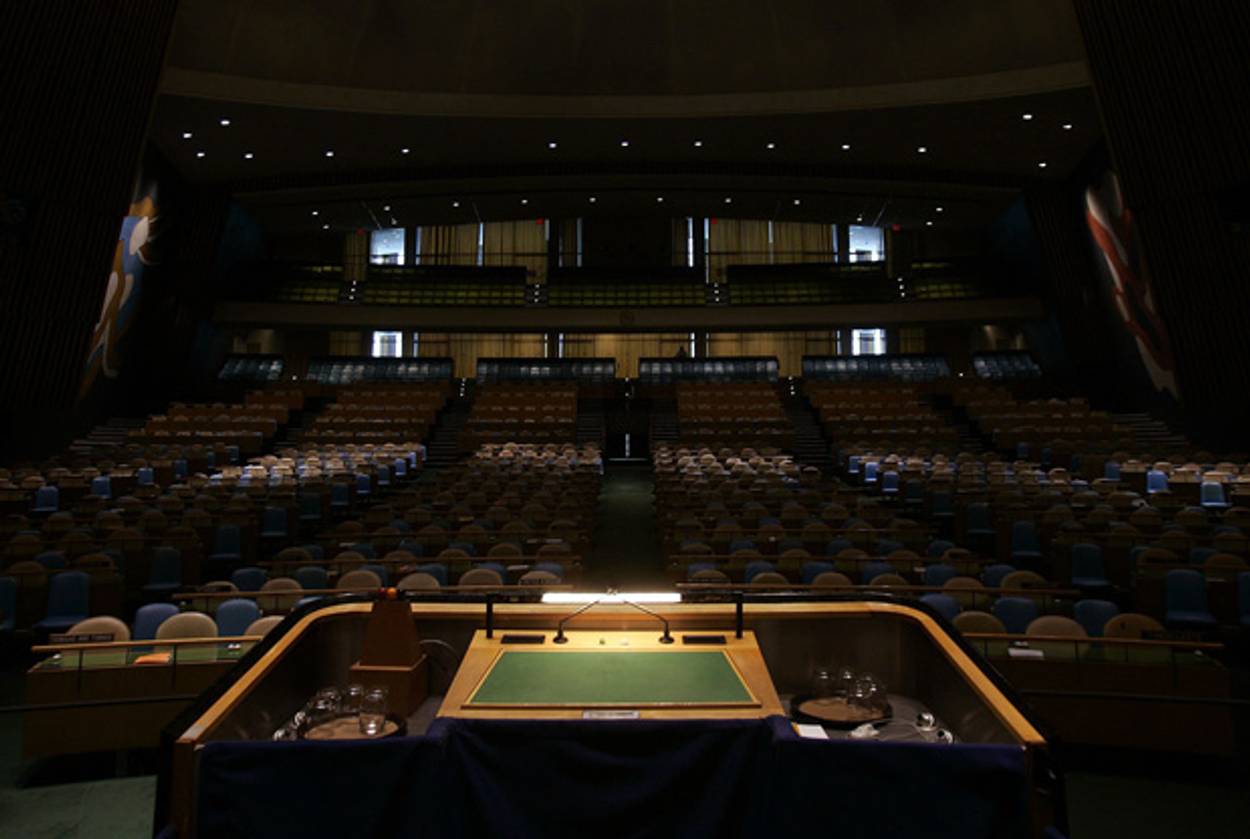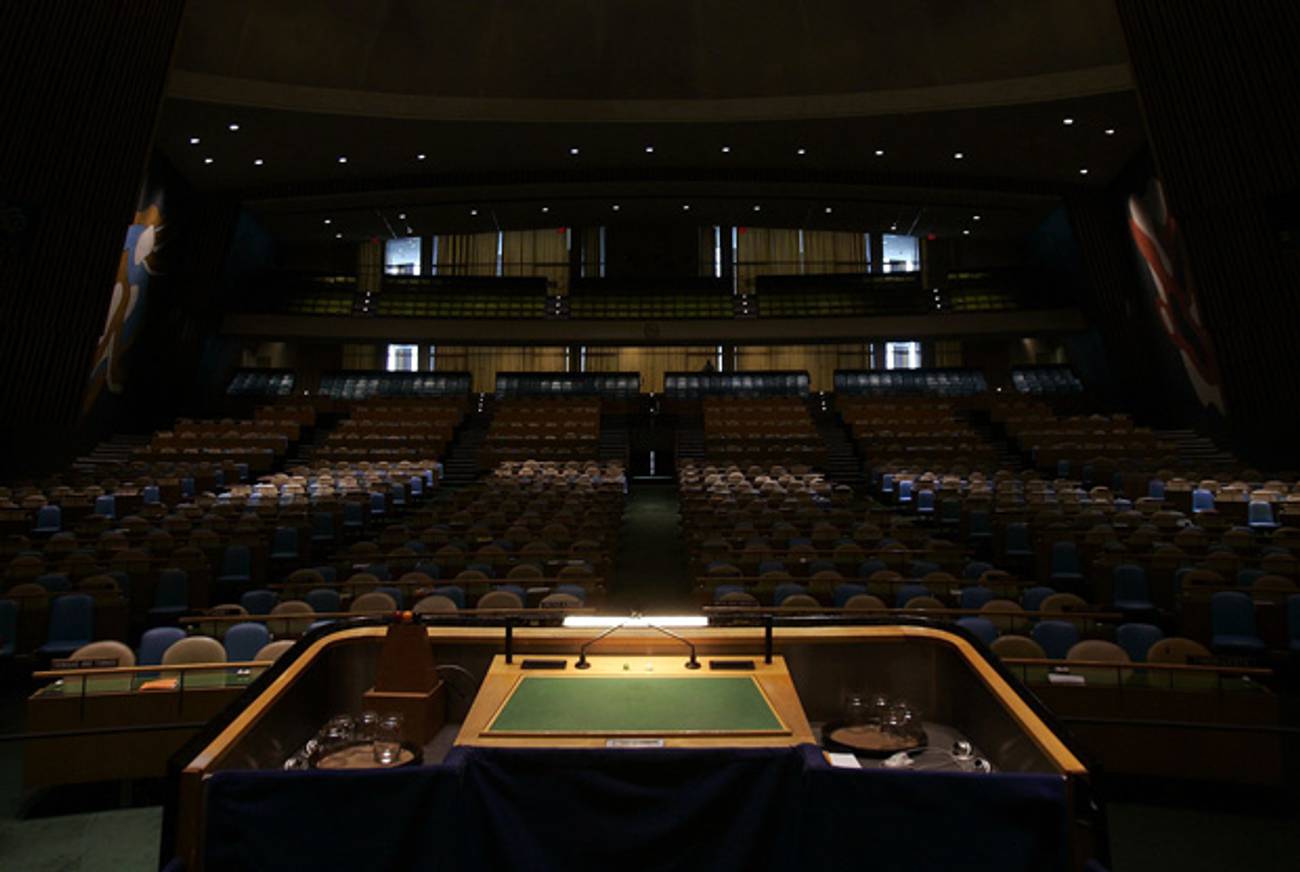Why Bibi Should’ve Stayed Home
Avoiding the U.N. circus would have sent a stronger message about the gravity of the Iranian threat




Yesterday, on Yom Kippur, the satirical paper The Onion posted an article with a headline “Glowing Ahmadinejad: ‘I Am the Nuclear Weapon We’ve Been Building.’” Last week, the New York Post reportedly sent a Jewish-themed welcome basket filled with gefilte fish and Zabar’s cream cheese to the Iranian leader upon his arrival in New York for the United Nations General Assembly. The Atlantic features an “Iran War Dial” on its website.
Satire can be a powerful weapon, but these are all examples of how ubiquitous and casual the talk about Iran nuclear’s program has become. As Prime Minister Benjamin Netanyahu ascends the podium at the United Nations General Assembly today to deliver another speech about Iran’s genocidal motives, one of the major challenges he faces is reaching a world audience that has become desensitized to the Iranian threat precisely because there’s been so much talk about it.
Of course, this is the opposite of what the Israeli leader—who has been arguing for over half a decade now that Iran’s leaders plan to eliminate Israel and are quickly approaching the means to do it—ever intended to do. But on the morning of seemingly his thousandth speech, a look back at previous years’ orations makes it hard to imagine what Netanyahu could say today that hasn’t already been said. One can’t help but wonder whether the most powerful message, the most convincing way to communicate to the world that the situation is more dire than ever, would have been for him to say nothing at all.
“It’s 1938, and Iran is Germany, and it’s racing to arm itself with nuclear weapons,” Netanyahu said at the United Jewish Communities General Assembly in 2006, when he was Israel’s opposition leader during Ehud Olmert’s administration. “Same tendencies: to slander and vilify its victim in preparation for slaughter. Ahmadinejad takes his cue from Hitler, and no one cares. Every week he talks about erasing Israel from the map, and no one says anything. Sometimes the Jews don’t say that much. The big difference: is that Hitler embarked on the conflict and then tried to develop atomic weapons.”
At a “Keep Jerusalem United” rally in 2007, he warned that “the countdown to a nuclear Iran continues and time is running out. With what little time remains, we must redouble our efforts to influence world leaders and international public opinion to act with determination against Iran, including through much tougher and more painful economic sanctions. Of course, we must be prepared to practice what we preach.”
In 2009, shortly after being sworn in as prime minister, Netanyahu said this at Bar-Ilan University: “The Iranian threat still is before us in full force, as it became quite clear yesterday. The greatest danger to Israel, to the Middle East, and to all of humanity, is the encounter between extremist Islam and nuclear weapons.”
That same year at the United Nations, he declared that the “most urgent challenge facing this body is to prevent the tyrants of Tehran from acquiring nuclear weapons.”
Speaking to Congress almost a year-and-a-half ago, Netanyahu said: “Now time is running out. The hinge of history may soon turn, for the greatest danger of all could soon be upon us: a militant Islamic regime armed with nuclear weapons.”
He followed that up at last year’s United Nations General Assembly by warning that if Iran’s nuclear program isn’t halted “the Arab Spring could soon become an Iranian winter.”
Netanyahu is nothing if not an effective speaker. And his rhetoric surely has something to do with the fact that an international coalition—seemingly an oxymoronic term—has created one of the harshest sanctions regimes ever to put the squeeze to Iran. Today, almost half of Iran’s oil exports sit in tankers without destinations.
The problem may be that Netanyahu has been too effective for too long. His cherished role as Churchillian prophet has made the very real threat of a nuclear Iran something that, after years of alarm, no longer seems outrageous, but inevitable. There is a growing sense that most people have come to accept the idea of Iran going nuclear. Even though the matter still hangs in the balance, Netanyahu’s outspoken impatience has given the international community’s response the look of a bluff that’s been called.
By virtue of his tone—the red lines, the strike, the turning back of the clock—Netanyahu may have painted Israel (and others) into a corner. When he steps to the podium today, it’s tough to imagine what words might raise the temperature once again. Rather than submit to the circus—or “farce” as Netanyahu has called the United Nations in previous addresses—the stronger message would have been silence.
***
Like this article? Sign up for our Daily Digest to get Tablet Magazine’s new content in your inbox each morning.
Adam Chandler was previously a staff writer at Tablet. His work has appeared in the New York Times, the Wall Street Journal, the Atlantic, Slate, Esquire, New York, and elsewhere. He tweets @allmychandler.
Adam Chandler was previously a staff writer at Tablet. His work has appeared in the New York Times, the Wall Street Journal, the Atlantic, Slate, Esquire, New York, and elsewhere. He tweets @allmychandler.